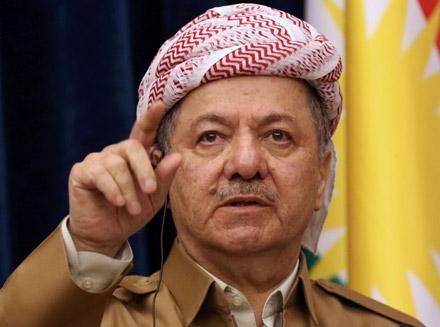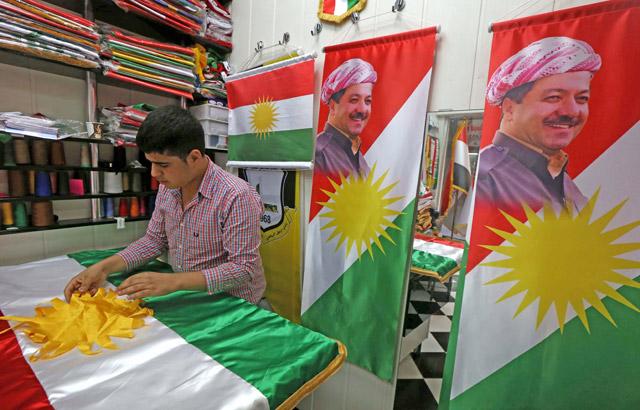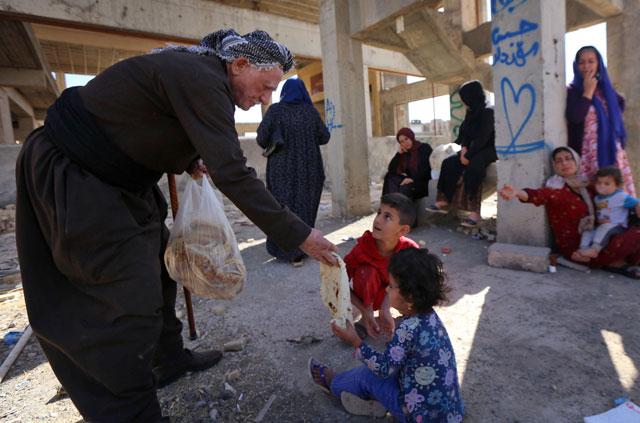You are here
Iraq's Shiite ruling coalition opposes Kurds' independence referendum
By Reuters - Apr 21,2017 - Last updated at Apr 21,2017

Iraqi Kurdish leader Massud Barzani gestures during a press conference with German foreign affairs minister in Erbil, the capital of the Kurdish autonomous region in northern Iraq, on Thursday (AFP photo)
CAIRO/ERBIL — Iraq's Shiite ruling coalition would oppose Kurdish plans to hold a referendum on independence after the defeat of Daesh, its president, Ammar Al Hakim, has said.
Speaking to Reuters in an interview in Cairo, Hakim advised the Kurds against any unilateral move to annex a disputed oil-rich region which they had gained during the war against the extremists.
"If this referendum happens, it will be unilateral," said Hakim, who is president of the National Alliance, a coalition of the main Shiite political groups including Prime Minister Haider Al Abadi's Dawa Party.
"We will insist on dialogue" as a mean to resolve the disagreement, the influential cleric said when asked what the Shiite parties would do if the Kurds insist on holding the referendum.
"We believe that the politics of accomplished facts and drawing borders with blood hasn't succeeded in any country of the world and won't have good results in Iraq either."
Iraq's majority Shiite Arab community is located mainly in the south while the Kurds and the Sunni Arabs live in opposite corners of the north. The centre around Baghdad is mixed.
Iraq's main Kurdish parties announced this month a plan to hold a referendum on independence this year.
The Kurds say the expected "yes" outcome will strengthen their hand in talks on self-determination with Baghdad and would not mean automatically declaring independence.
"The purpose of the referendum is to seek out the opinion of the Kurds and then start a dialogue with Baghdad," Massoud Barzani, the president of Kurdistan Regional Government (KRG), told reporters on Thursday in the Iraqi Kurdish capital Erbil.
The Kurdish forces control more territory now than the area on which the KRG was established after the US-led invasion that toppled Saddam Hussein in 2003.
Iraqi Kurdish independence has been historically opposed by Iraq and also its neighbours, Iran, Turkey and Syria, as they fear the contagion for their own Kurdish populations.
Iraq's Kurds have advanced the most toward their long-held dream of independence. Iraq has been led by the Shiites since the overthrow of Saddam Hussein, a Sunni.
The Kurds have their own armed force, the peshmerga, which in 2014 prevented Daesh from capturing the oil region of Kirkuk after the Iraqi army fled in the face of the militants. They are effectively running the region also claimed by Turkmen and Arabs.
Hardline Iranian-backed Iraqi Shiite militias have threatened to expel the Kurds by force from this region and other disputed areas.
Hakim, however, downplayed the risk of miltary confrontation between the Shiite and the Kurds.
"Using weapons against Iraqis is not an option," he said.
Kirkuk's Kurdish-led provincial council rejected this month a resolution by the Iraqi parliament in Baghdad to lower Kurdish flags raised since March next to Iraqi flags over public buildings of the region.
Masrour Barzani, head of the KRG's Security Council and son of President Barzani, said in June that Iraq should be divided into three separate entities to prevent further sectarian bloodshed, with a state each given to the Shiites, the Sunnis and the Kurds.
Hakim said he suggested to Egyptian President Abdel Fattah Al Sisi, whom he met on Tuesday, to host a meeting of rival Sunni and Shiite countries in the region to try find common grounds in prelude to ending the sectarian strife raging since 2011.
The meeting, gathering Iraq, Iran, Turkey, Saudi Arabia and Egypt would seek "to define the spheres of influence" for each, "and also spheres of cooperation", for example against terrorism, he said.
Related Articles
ERBIL, Iraq — Iraq's autonomous Kurdish region on Wednesday announced it would hold a referendum on independence, in a move the central gove
ERBIL, Iraq/BAGHDAD — About 100,000 Kurds have fled the Kirkuk region for fear of persecution since Iraqi armed forces retook disputed terri
WASHINGTON — The United States on Monday urged Iraq's federal government and Kurdish Regional Government institutions to resolve their disag













